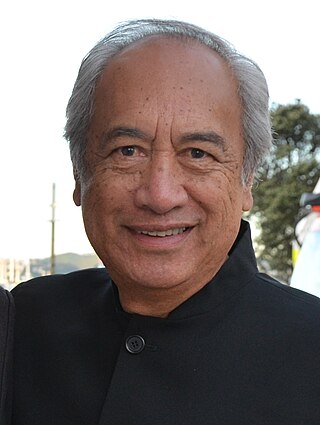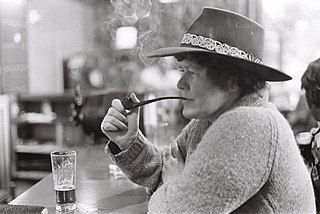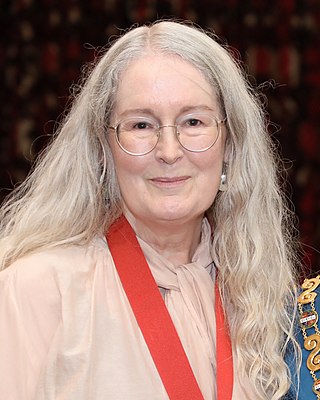Related Research Articles

Kathleen Mansfield Murry was a New Zealand writer and critic who is considered to be an important author of the modernist movement. Her works are celebrated across the world, and have been published in 25 languages.

New Zealand literature is literature, both oral and written, produced by the people of New Zealand. It often deals with New Zealand themes, people or places, is written predominantly in New Zealand English, and features Māori culture and the use of the Māori language. Before the arrival and settlement of Europeans in New Zealand in the 19th century, Māori culture had a strong oral tradition. Early European settlers wrote about their experiences travelling and exploring New Zealand. The concept of a "New Zealand literature", as distinct from English literature, did not originate until the 20th century, when authors began exploring themes of landscape, isolation, and the emerging New Zealand national identity. Māori writers became more prominent in the latter half of the 20th century, and Māori language and culture have become an increasingly important part of New Zealand literature.

Maurice Gough Gee is a New Zealand novelist. He is one of New Zealand's most distinguished and prolific authors, having written over thirty novels for adults and children, and has won numerous awards both in New Zealand and overseas, including multiple top prizes at the New Zealand Book Awards, the James Tait Black Memorial Prize in the UK, the Katherine Mansfield Menton Fellowship, the Robert Burns Fellowship and a Prime Minister's Award for Literary Achievement. In 2003 he was recognised as one of New Zealand's greatest living artists across all disciplines by the Arts Foundation of New Zealand, which presented him with an Icon Award.

Witi Tame Ihimaera-Smiler is a New Zealand author. Raised in the small town of Waituhi, he decided to become a writer as a teenager after being convinced that Māori people were ignored or mischaracterised in literature. He was the first Māori writer to publish a collection of short stories, with Pounamu, Pounamu (1972), and the first to publish a novel, with Tangi (1973). After his early works he took a ten-year break from writing, during which he focused on editing an anthology of Māori writing in English.

Keri Ann Ruhi Hulme was a New Zealand novelist, poet and short-story writer. She also wrote under the pen name Kai Tainui. Her novel The Bone People won the Booker Prize in 1985; she was the first New Zealander to win the award, and also the first writer to win the prize for a debut novel. Hulme's writing explores themes of isolation, postcolonial and multicultural identity, and Maori, Celtic, and Norse mythology.

Christian Karlson "Karl" Stead is a New Zealand writer whose works include novels, poetry, short stories, and literary criticism. He is one of New Zealand's most well-known and internationally celebrated writers.

William Manhire is a New Zealand poet, short story writer, emeritus professor, and New Zealand's inaugural Poet Laureate (1997–1998). He founded New Zealand's first creative writing course at Victoria University of Wellington in 1975, founded the International Institute of Modern Letters in 2001, and has been a strong promoter of New Zealand literature and poetry throughout his career. Many of New Zealand's leading writers graduated from his courses at Victoria. He has received many notable awards including a Prime Minister's Award for Literary Achievement in 2007 and an Arts Foundation Icon Award in 2018.

Elsie Violet Locke was a New Zealand communist writer, historian, and leading activist in the feminism and peace movements. Probably best known for her children's literature, The Oxford Companion to New Zealand Literature said that she "made a remarkable contribution to New Zealand society", for which the University of Canterbury awarded her an honorary D.Litt. in 1987. She was married to Jack Locke, a leading member of the Communist Party.

Elizabeth Fiona Knox is a New Zealand writer. She has authored several novels for both adults and teenagers, autobiographical novellas, and a collection of essays. One of her best-known works is The Vintner's Luck (1998), which won several awards, has been published in ten languages, and was made into a film of the same name by Niki Caro in 2009. Knox is also known for her young adult literary fantasy series, Dreamhunter Duet. Her most recent novels are Mortal Fire and Wake, both published in 2013, and The Absolute Book, published in 2019.
Barry Mitcalfe was a New Zealand poet, editor, and peace activist.

Sir Vincent Gerard O'Sullivan is one of New Zealand's best-known writers. He is a poet, short story writer, novelist, playwright, critic, editor, biographer, and librettist.
The Katherine Mansfield Menton Fellowship, formerly known as the New Zealand Post Katherine Mansfield Prize and the Meridian Energy Katherine Mansfield Memorial Fellowship, is one of New Zealand's foremost literary awards. Named after Katherine Mansfield, one of New Zealand's leading historical writers, the award gives winners funding towards transport to and accommodation in Menton, France, where Mansfield did some of her best-known and most significant writing.
Marilyn Rose Duckworth is a New Zealand novelist, poet and short story writer. Since her first novel was published at the age of 23 in 1959, she has published fifteen novels, one novella, a collection of short stories and a collection of poetry. Many of her novels feature women with complex lives and relationships. She has also written for television and radio. Over the course of her career she has received a number of prestigious awards including the top prize for fiction at the New Zealand Book Awards for Disorderly Conduct (1984) and a Prime Minister's Award for Literary Achievement in 2016.
Arapera Hineira Blank was a New Zealand poet, short-story writer and teacher. She wrote in both te reo Māori and English, and was one of the first Māori writers to be published in English. Her work focussed on aspects of Māori life and the life of women. In 1959 she was awarded a special Katherine Mansfield Memorial Award for a bilingual essay. In 1986 she published a collection of poetry, and after her death her son published a further collection of her writing in 2015.
Alfred Augustus Grace was a New Zealand teacher, journalist and writer. He was born in Auckland, Auckland, New Zealand on 1867. He wrote literature such as short stories, novels, folklore collections, and other literature that was read in New Zealand, Australia and England. Although he was known in his local communities for his contributions, he achieved nationwide fame for his writing. Grace wrote literature such as short stories and novels. Some of his famous literature was Maoriland stories, Tales of a dying race, and The tale of Timber Town. Grace majorly wrote stories that portray Maori cultures. His first major literature was called Maoriland stories that was published in 1895. He continuously wrote fiction until 1914 with The Tales of timber town as the last fiction literature that Grace wrote.

Sue Wootton is a New Zealand writer, specialising in poetry and short fiction.

Kate De Goldi is a New Zealand novelist, children's writer and short story writer. Her early work was published under the pseudonym Kate Flannery.
Rowan Metcalfe (1955–2003), also known as Rowan Pahutini, was a New Zealand novelist, short-story writer, poet, editor and journalist. She won the Katherine Mansfield Memorial Award for a short story in 1997, having won the Young Writers award in 1974, and her first and only novel Transit of Venus was published posthumously in 2004.
Alice Maria Glenday was a New Zealand novelist, short-story writer and playwright. Born in Canada, she moved to New Zealand in 1949 as a young married woman, and began writing in the mid-1950s. In 1969 she was the first woman to receive the Katherine Mansfield Memorial Award for her short story "One Fine Day". She published two novels, Follow, Follow (1973) and A Population of One (1991), and won several playwriting competitions run by the British Drama League.
References
- ↑ Hamilton, Stephen (1997). "Recognition, and rewards of success". Book & Print in New Zealand : A Guide to Print Culture in Aotearoa. Wellington, NZ: Victoria University Press. ISBN 0-86473-331-3. Archived from the original on 5 February 2018. Retrieved 29 September 2021.
- 1 2 Derby, Mark. "Page 2. Literary awards, 1950s onwards". Te Ara – The Encyclopedia of New Zealand. Archived from the original on 3 November 2020. Retrieved 5 March 2021.
- 1 2 3 "Katherine Mansfield Awards". BNZ Heritage. Archived from the original on 2 March 2021. Retrieved 5 March 2021.
- 1 2 "Katherine Mansfield Memorial Awards". National Library of New Zealand. Retrieved 29 September 2021.
- ↑ "New Award for Writers". The Press. 5 June 1959. p. 13. Retrieved 29 September 2021.
- ↑ "Katherine Mansfield Award is Shared by Two Writers". The Press. 16 October 1959. p. 14. Retrieved 29 September 2021.
- ↑ "Mansfield Award: Auckland Man Wins". The Press. 21 October 1961. p. 13. Retrieved 29 September 2021.
- 1 2 3 4 5 Tolerton & Tonks 1999, pp. 6–8.
- ↑ "Absence of Maoris: Disappointed Governor". The Press. 17 October 1963. p. 8. Retrieved 21 July 2022.
- ↑ Tolerton & Tonks 1999, pp. 9–11.
- 1 2 3 4 5 6 Wells, Amanda (2 April 2001). "Short stories go online". Dominion. p. IT1.
- ↑ "Prize money doubled for Katherine Mansfield short story awards". The New Zealand Herald. 3 May 2004. Retrieved 30 September 2021.
- 1 2 3 4 "BNZ Literary Awards". Christchurch City Libraries. Retrieved 30 September 2021.
- ↑ "KM Short Story Competition". Katherine Mansfield House & Garden. Retrieved 30 September 2021.
- ↑ Tolerton & Tonks 1999, p. 21.
- ↑ Irving, Denise (16 October 2004). "Story 'just fell into place'". Waikato Times. p. D4.
- ↑ Tolerton & Tonks 1999, p. 50.
- ↑ Tolerton & Tonks 1999, p. 60.
- ↑ Reed, Lucy (15 October 2004). "Thames writer wins award". Waikato Times. p. 3.
- 1 2 "Compelling writing rewards Nixon". The Press. 5 October 2007. p. A3.